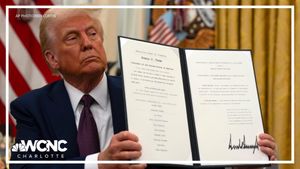Kash Patel, nominated for leadership at the FBI, faced intense scrutiny during his confirmation hearing held on February 1, 2025, as lawmakers delved deepinto his past comments and associations.
Senator Chuck Grassley, R-Iowa, initiated questioning on the challenging topic of the "QAnon" conspiracy theory, which alleges the existence of a secret cabal of Satan-worshiping pedophiles demanding power over high-profile sectors including government and media. This conspiracy has resurfaced alongside Patel’s nomination, raising concerns over his possible alignment with its proponents. Patel, known for his close ties with former President Trump, vehemently denied any affiliation, stating, "No, senator. I have publicly, including in the interviews provided to this committee, rejected outright QAnon's baseless conspiracy theories or any other baseless conspiracy theories."
The scrutiny did not end there. Senator Dick Durbin pressed Patel on his associations with far-right extremists such as Laura Loomer, known for her vocal promotion of conspiracy theories and racist rhetoric. When presented with photographs of Patel and Loomer together, he refrained from directly condemning her, claiming, "I don't believe I'm guilty by association ... I detest any conjecture to the contrary." This remark attempted to distance him from Loomer's controversial status, yet it illustrated the complexity of his social and political ties.
During the hearing, the question of January 6th loomed large. Many senators sought clarity from Patel on President Trump’s controversial clemency actions for individuals associated with the Capitol riots, events which saw extensive violence against law enforcement. Durbin pointed out the severe consequences stemming from such actions and challenged Patel's stance, querying whether the President's past leniencies were misguided. Patel expressed dissent, saying, "I have always rejected any violence against law enforcement ... and I do not agree with the commutation of any sentence of any individual who committed violence against law enforcement." Such statements indicated his integrity toward law enforcement—a notable departure from some of the more lenient perspectives voiced during and after the riots.
Senator Adam Schiff, D-Calif., grew increasingly agitated as he interrogated Patel about his previous support of the so-called "January 6 choir," which comprised jailed defendants who raised funds through music. Patel was questioned about his connections to the group and the apparent contradictions between his past endorsements and his current disavowals of violence. He faced pointed inquiries about his contributions to the group's song, with Schiff highlighting Patel’s earlier remarks, stating, "You're part of the 'we,' right? When you say 'we,' ... includes you, doesn't it Mr. Patel?" While Patel argued he wasn't involved with the choir's specific activities, it was evident his past words were difficult to wholly dismiss.
Nonetheless, Patel attempted to maintain his semblance of professionalism, stating firmly, "Anyone, anyone who commits act of violence against law enforcement must be investigated, prosecuted and imprisoned." His insistence on holding accountability reflects efforts to align with the interests of the judiciary, even as the specter of his previous comments loomed large over the proceedings.
Grassley tried to stave off anticipated critiques from Democrats about Patel's past remarks on QAnon, motions reminiscent of previous confirmation hearings of his allies. Amid this back-and-forth, Patel consistently reiterated his refusal to engage with conspiracy theories, stating, "I have publicly, including in the interview provided to this committee, rejected outright QAnon's baseless conspiracy theories..." Despite these claims, skepticism remained from the Democratic side of the aisle—especially with Patel's controversial history swirling around him.
Further fueling apprehensions, Patel had previously expressed controversial views on the FBI’s structure as well, indicating he believed the bureau's headquarters should be turned outside the capital and repurposed as a museum reflecting the perceived "Deep State." When pressed by Senator Chris Coons to clarify these notions, Patel tried to downplay his previous statements, arguing he was merely advocating for thoughtful redistribution of agents to locales beyond Washington D.C.
The culmination of these exchanges reveals the challenging terrain Patel must traverse as he confronts both the Senate committee and public perception during this nomination process. His responses and the scrutiny surrounding them could play pivotal roles on whether he eventually secures the position of leadership at the FBI.
For now, the spotlight remains firmly placed on Kash Patel—an individual walking the tightrope of past alliances, public expectations, and the pressing need for transparency within the FBI amid rising political tensions.



